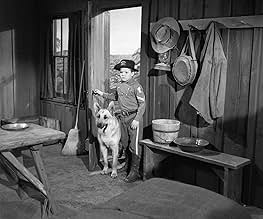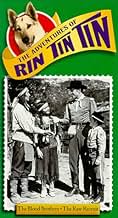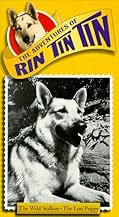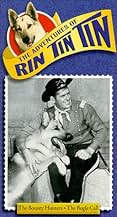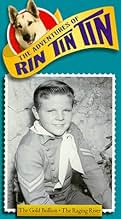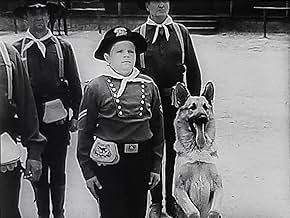AVALIAÇÃO DA IMDb
7,0/10
921
SUA AVALIAÇÃO
Rusty ficou órfão em uma batida indiana. Ele e seu cão Rin Tin Tin Tin foram adotados pelas tropas no Forte Apache no Arizona e ajudaram a estabelecer a lei e a ordem em Mesa Grande e nos ar... Ler tudoRusty ficou órfão em uma batida indiana. Ele e seu cão Rin Tin Tin Tin foram adotados pelas tropas no Forte Apache no Arizona e ajudaram a estabelecer a lei e a ordem em Mesa Grande e nos arredores.Rusty ficou órfão em uma batida indiana. Ele e seu cão Rin Tin Tin Tin foram adotados pelas tropas no Forte Apache no Arizona e ajudaram a estabelecer a lei e a ordem em Mesa Grande e nos arredores.
- Indicado para 1 Primetime Emmy
- 2 indicações no total
Explorar episódios
Avaliações em destaque
Forty years ago my French colleague told me that the name Rin Tin Tin was French and should be pronounced "rrrran tan tan", nasally. It's the sound of the drumstick tapping on the drum; it's the cavalry's drum. Presumably this name goes back to the old days when French was spoken in some of the southern states of the US. (This comment really belongs under Trivia; I tried unsuccessfully to put it there.)
Back in the day when I was in my single digit years, Rin Tin Tin made his television debut in a series about an orphan kid and the German shepherd puppy found by Cavalry as the only survivors of a wagon train massacre. It was a great TV kid's show and still running in syndication someplace in the world.
We never knew what Rusty's last name was. Lee Aaker played the boy who I thought was lucky at the time to live and grow up on an army post in territorial Arizona. What a great childhood.
Aaker was supported by a good group of movie professionals like James Brown, Joe Sawyer, and Rand Brooks. But it was the boy and the dog and like the previous reviewer, I can still hear the cry of Yo Rinty when Rusty sicced him on a bad guy.
I still remember the episode where Rusty saw the legendary White Buffalo and there were two episodes in which a British colonel and his batman came over from India and later the Fort Apache regulars go over there to deal with real Indians.
Shows for a more innocent time.
We never knew what Rusty's last name was. Lee Aaker played the boy who I thought was lucky at the time to live and grow up on an army post in territorial Arizona. What a great childhood.
Aaker was supported by a good group of movie professionals like James Brown, Joe Sawyer, and Rand Brooks. But it was the boy and the dog and like the previous reviewer, I can still hear the cry of Yo Rinty when Rusty sicced him on a bad guy.
I still remember the episode where Rusty saw the legendary White Buffalo and there were two episodes in which a British colonel and his batman came over from India and later the Fort Apache regulars go over there to deal with real Indians.
Shows for a more innocent time.
Has anyone out there figured out the connection of Rin Tin Tin, the TV series in the 1950s with the Rusty film series of a decade earlier? My hunch is this: The popular TV series which I faithfully watched from 1955-59 (itself spawned by the one year radio show in 1955), is a conflation of the popular Rin Tin Tin canine hero of the post-World War I era in books and movies with the Rusty movie series of eight films produced by Columbia Pictures 1945-1949. In the Rusty movies the German Shepherd is named Rusty and there are various young boys in the lead roles. In the TV series, the dog becomes again Rin Tin Tin and the boy lead becomes Rusty, played by Lee Aakers. Those folks old enough to have been fans in the 1930s and 1940s would have caught the connection at once. But those of us who were 1950s fans would have missed it entirely. Our Rusty for the years 1955-59 (and later in reruns) was a survivor of an Indian raid, who with his dog that he called "Rinty," as in the original books, was rescued by Cavalry to live in the confines and supportive community of Fort Apache. We came to think of characters like Sgt. Biff O'Hara and Lt. Rip Masters as part of our extended family. By the way, James Brown, who played Lt. Rip Masters, showed up again as a regular former policeman-turned J.R. Ewing informant and operative on the Dallas Series in the 1970s.
This show kept this little kid riveted to the lounge room in the mid 60s after which I would go and play with my 'Timpo Toys' miniature cavalry soldiers. Most memorable aspects of the show for me was how lucky Rusty was to be in the cavalry at his age (mine too) and that bugle call that was played whenever the cavalry, led by Rip and Biff, were coming over the hill to save the day. I used to mimic that bugle call with my toys and drive my mother nuts. Only disappointing thing was that Rusty never carried a gun, although I seem to remember that he did get his hands on one in one episode. Does anybody else remember that? Rusty the orphan found his family in the paternal Lt Rip Masters, the avuncular Sgt Biff O'Hara and the fraternal Cpl Boone (don't know if I ever heard his first name). The show was notable for its dearth of female characters. I would like to hear Quentin Tarantino's comments about that. As a catholic schoolboy I always half expected the nuns to arrive in a wagon one day and try to cart Rusty off to an orphanage. I actually used to pray that that would never happen
As a little girl, this was one of my favorite shows, and I had a major crush on Rusty. I have often wondered what became of him and the other actors on the show. From this website, it looks as though they are still around. I'm happy to see that. To say it was of a more innocent time is certainly an understatement! Today I happened to be in a nail salon (captive by a TV screen) where they played Britney Spears' videos until my head almost exploded. Contrast that kind of garbage with the stuff we got to watch, and it makes me glad to be old. I also liked to watch Sky King, Mickey Mouse Club, Captain Gallant Foreign Legion, Spin & Marty and The Three Stooges. Those were the days, as Archie & Edith would say.
Você sabia?
- CuriosidadesThe series was shot on the set of the John Ford western Sangue de Heróis (1948).
- Erros de gravaçãoThe adventures happen in the 1869-1877 period as we can see president Grant in Season 2, Episode 7. The German Shepherd is a relatively new breed of dog, with their origin dating to 1899 so the whole series is an historical mistake.
- Versões alternativasTowards the end of the 1970s nostalgia boom, this series was re-released in sepia-tone, with new color wraparounds featuring James Brown in character as Lt. Masters, "telling" each installment's story to a group of children.
- ConexõesEdited into Rin-Tin-Tin: Hero of the West (1991)
Principais escolhas
Faça login para avaliar e ver a lista de recomendações personalizadas
- How many seasons does The Adventures of Rin Tin Tin have?Fornecido pela Alexa
Detalhes
- Data de lançamento
- País de origem
- Idioma
- Também conhecido como
- The Adventures of Rin Tin Tin
- Locações de filme
- Empresa de produção
- Consulte mais créditos da empresa na IMDbPro
- Tempo de duração
- 30 min
- Cor
- Mixagem de som
- Proporção
- 1.33 : 1
Contribua para esta página
Sugerir uma alteração ou adicionar conteúdo ausente

